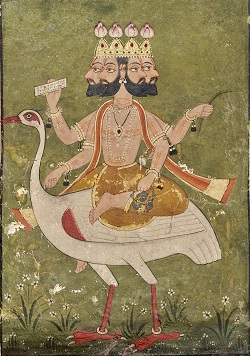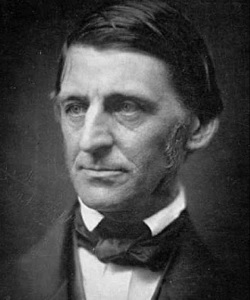Dec 29, 2025
Dec 29, 2025
 If the red slayer think he slays,
If the red slayer think he slays,
Or if the slain think he is slain,
They know not well the subtle ways
I keep, and pass, and turn again.
Far or forgot to me is near;
Shadow and sunlight are the same;
The vanished gods to me appear;
And one to me are shame and fame.
They reckon ill who leave me out;
When me they fly, I am the wings;
I am the doubter and the doubt,
I am the hymn the Brahmin sings.
The strong gods pine for my abode,
And pine in vain the sacred Seven;
But thou, meek lover of the good!
Find me, and turn thy back on heaven.
How did he come to write Brahma? How were the feelings going within, the undercurrents of thought and idea that he could accomplish about so many years ago when the world knew it not all, when the world was not new? How did he work on Orientalism? It is really a matter of reckoning. Why did he choose Brahma? Did he mean to give a new direction and impetus to American poetry? Did he attempt to comprehend the creational force, trying to delve into the mysteries and myths of life and death and the world? How the phenomena, the perspectives and realms laid bare, attempted, un-attempted, muffling the truth though cannot be resolved as it is known to all? Instead of it, he tries to have a tryst with the Creational Divine.
Brahma, the Creator of the Universe, the Omnipotent, Omniscient and Omnipresent God is the speaker of the poem, the spokesman, the mouthpiece and the poet speaking through make it available the sermon. The concept is, Brahma is the creator of all; everything but into the hands of his.
There is a little bit confusion with regard to the title. Is it about Brahma? Brahma the Hindu God of Creation or Brahma, Brahman, the Over Mind, the Over Soul or the realization of the cosmos within, what is it? What is Brahma or Brahman if thought here as the Universal Soul, the Universal Mind felt within the self, the human soul will relate to as such. But here as words show it there lie in the creational matter as of Brahma, the Maker of the Universe without whose blessings the creative cannot be imagined.
If the red slayer thinks that he can slay and the slain taking it for being killed as there is no way out of, it must be kept in mind that the things keep rounding about, rotating; the things are not so as they seem to be. The Wheel of Fate keeps it rotating and it is difficult to say what is whose lot? The slayer too has nothing to be proud of and the slain too need not to be lowly and annihilated. The god of death may be credited with the limiting of one’s time-span and the cutting short of the drama of life. But to Brahma the slayer and the slain are alike. He sees the slain too with the same eyes as his blessings are for all.
What to say about the farthest most and what about the nearest ones? He can see it all, foresee and oversee, what it happening, what it to take place, a knower of it all. Nothing is unseen from him; nothing hidden from him. Shadow and sunlight are but the sides of the same element. A cyclic order of the same; the two parts of the same thing, is the matter to be understood. Even gods vanished appear to him as he can feel about. Shame and fame are too but one to him. The world is a lila as this has to go. Things cannot come to a stop and this is called creation.
Those who know him not know it nothing; the universal energy, the life force. What it to say, that creational force which one assumes or not. To be creative is to think in a new way based on supposition and presumption opening the avenues of thought and idea and a plethora thereafter.
It is without doubt a poem of Brahma that he got to write after reading the Upanishads, the Bhagavad-Gita and so on. In Hinduism, Brahma is one of the Trinity, Brahma, Vishnu, Maheshwara. If Brahma is the Creator of the Universe, Vishnu is the Preserver and Mahesh the Destroyer. When we think of Brahma, the lotus like imagery, fancy and imagination will definitely be our properties to dispense and deal with. He is both the doubter and the doubt. The Brahmins pray to him most and sing of his glory.
The gods pine for his seat and place, the sacred seven sages too keep thinking about, but he has his own realms to delve into, the fancies to dip into, whims and whiffs to feel and go by, dreams to adorn, imagination to add to and to create and re-create fashioning it all afresh. Man as meek adorer of the good with belief in the heaven must try to find him. One can feel the beauty of the Creation in his works.
A poem of Brahma and his Brahmanda, it is really one of the transcendental poems pre-dating Eliot’s The Waste Land and Yeats’ Meru. Still the people say it as hearsay, Brahma’s writ as he is the doer, nurturer and the unseen fate of all that it happens, takes place.
The first stanza of the poem sets the theme rolling:
If the red slayer think he slays,
Or if the slain think he is slain,
They know not well the subtle ways
I keep, and pass, and turn again.
The proposition with which the poem begins is stupendous. If the slayer thinks that he kills is but the mistake of his and if the slain thinks, he is killed and hopeless and helpless this too is a mistake on his part to think as Brahma’s work is to create, fashion it fresh and the Creator never disheartens anyone. He keeps, passes and turns again.
The lines quoted below tell of how his doubts and the things doubted are substantial to his understanding of the Creation:
I am the doubter and the doubt,
I am the hymn the Brahmin sings.
But one must try to follow him to be endowed and bestowed upon:
But thou, meek lover of the good!
Find me, and turn thy back on heaven.
 When Emerson wrote it few could know it about as such was the celestial fire in him, which kept burning to show it light to the world. We are really proud of finding an Orientalist in him. What we the Indians failed to comprehend, Emerson took to his grasp and understanding. Still now his Brahma is debated and discussed and the readers fail to understand what it is in the poem; what it is that he has written deriving from Hindu texts and mythology. But we are sure of it too that even in future the coming generations will keep debating and discussing what it is in Emerson’s Brahma; why has he written it and has titled so. And as thus his Brahma has turned into an American Brahma, showing light to man, delving deep into the ideas, thoughts and reflections of life, death and the world.
When Emerson wrote it few could know it about as such was the celestial fire in him, which kept burning to show it light to the world. We are really proud of finding an Orientalist in him. What we the Indians failed to comprehend, Emerson took to his grasp and understanding. Still now his Brahma is debated and discussed and the readers fail to understand what it is in the poem; what it is that he has written deriving from Hindu texts and mythology. But we are sure of it too that even in future the coming generations will keep debating and discussing what it is in Emerson’s Brahma; why has he written it and has titled so. And as thus his Brahma has turned into an American Brahma, showing light to man, delving deep into the ideas, thoughts and reflections of life, death and the world.
How could he write the poem? How the origin and source of his that he took the notes from to draft it titling Brahma? Really, Emerson was an American pundit, Brahmin; a poet of the Over Mind, the Over Soul; an Orientalist par excellence; an transcendentalist American scholar rarely to be found in the history of letters and poetry who had definitely been ahead of time and his age.
11-Jul-2020
More by : Bijay Kant Dubey